You shouldn’t try breeding your budgie without providing a suitable breeding environment. An unsuitable nest or cage can bring many inconveniences for the hen, including laying eggs on the cage floor instead of the nest.
Should you be worried if your budgie lays eggs on the bottom of the cage? Since it’s not the ideal way of laying eggs, there’s something to be done about it. It’s not serious if your budgie’s doing that occasionally, or the egg accidentally falls or winds up on the floor from the perch. Although you can pick up the eggs and put them in the nest box, touching the eggs with bare hands is a terrible practice.
If the hen intentionally lays eggs on the bottom of the cage due to some inconveniences in the breeding environment, you need to find and fix them immediately. Read the article here to know more about setting up a suitable environment for your breeding budgie.
Why’s Budgie Laying Eggs on Bottom of Cage: Causes & Fixes?
Your budgie might be laying eggs on the bottom of the cage for many reasons. Here we’ve figured out all the possible causes and their fixes. Let’s check out.
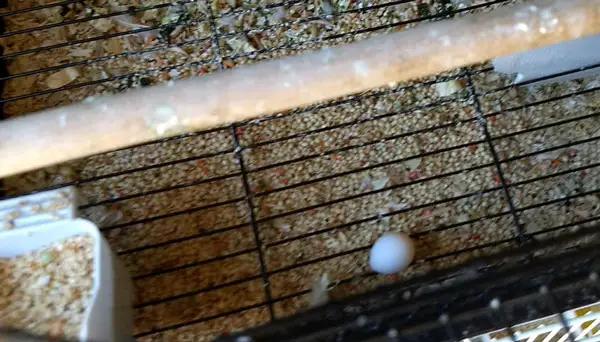
Inadequate Space in the Cage
If you’ve got a small cage for your ready-to-breed budgie couple, you can expect many inconveniences, including budgie laying eggs on the bottom of the cage. The breeding cage has to be large enough to accommodate a breeding budgie couple, a nest, a perch, and a roaming space. An ideal dimension for a breeding cage is around 24″ W x 24″ L x 36″ H.
Uncomfortable Room Environment
An uncomfortable breeding budgie may stay close to the cage bottom and lay eggs there. Put the cage in a comfy place in the room and keep it at a temperature between 70 to 75 degrees Fahrenheit. Also, keep it away from breeze-passing windows.
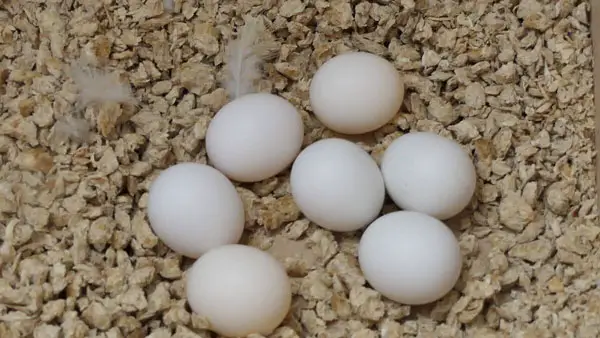
Unsuitable or No Nesting Box
The lack of a comfortable nest is probably the most significant cause here. A nest is the most natural place for the hens to lay eggs on. When the hen starts to lay eggs, she usually experiences breeding hormones and loves to spend her time nesting.
So provide your breeding hen with a nest box made of unscented pine shavings or give them her torn pieces of paper, which she can use to prepare her own nest. An ideal nest size for a breeding hen would be 12″ x 12.
Noise & Lack of Privacy
If your breeding budgie is still laying eggs on the cage floor even after setting up the breeding cage and a comfy nest box, they’re probably feeling unsettled and stressed due to a noisy environment. Budgies can be sensitive to noise like high television volume or chirrups from the other birds.
Too much noise and interaction can get them stressed, so they might try to get away and search for her private spot to end up at the bottom of the cage. So always keep them in a peaceful environment during the breeding period.
First Timer
Young budgies who lay eggs for the first time mightn’t know the right place to deposit their eggs. As a result, they might leave them on the cage floor instead of the nest box.
You can train her by picking and placing the eggs into the nest. It’ll make her understand that the nest box is where she should lay her eggs. Handle the eggs with gloves for a limited time, as budgies don’t like their eggs touched.
Eggs Falling from the Perch
One of the most common reasons you probably see eggs on the cage floor is when they fall or wind up on the bottom of the cage. If the budgie lays eggs while sitting on the perches, they’ll fall onto the floor and probably break.
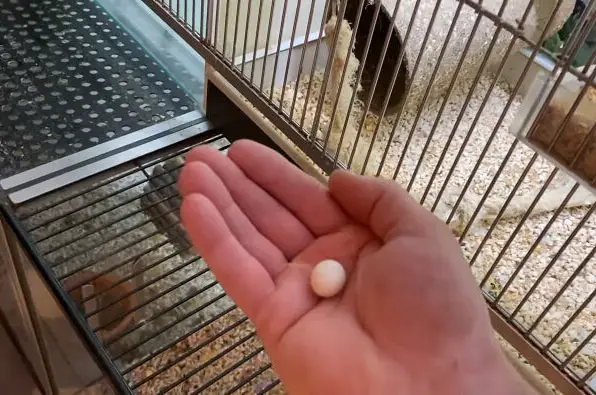
However, it generally happens with young birds with no egg-laying experience. The good thing is she’s a quick learner and soon realizes where she should ideally lay her eggs.
Also read: How Often Do Budgies Molt?
Thrown from the Nest
If a budgie doubts the egg to be damaged or infertile, especially if that doesn’t have her scent, she may throw it intentionally out of the nest onto the cage floor.
Make sure to use gloves whenever you touch the egg that’s supposed to be hatched. They can also throw eggs on the cage floor to create more room or while suffering from any environmental stress. So always provide a suitable environment for the hen during the nesting periods.
Health Issues
A sick hen may leave the nest and lay an egg anywhere in the cage, including the cage floor. The breeding budgies require more calcium and minerals than usual, so ensure they are provided with calcium supplements and more electrolytes in the diet. If there’s any sickness, get your budgie checked by an avian vet and follow the guidelines accordingly.
Why You Should Avoid Touching Eggs Fallen on the Floor?
You might want to handle the eggs if you see them on the cage floor or think it’s not viable for hatching. But you shouldn’t do it continuously. If you pick up the eggs with bare hands and put them back in the nest, the budgie may refuse it as she won’t find her smell.
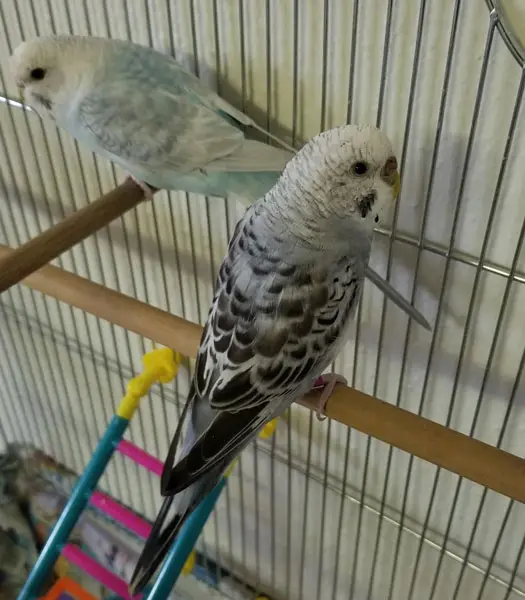
But she might continue producing more eggs to replace the discarded ones. It can lead to chronic egg-laying conditions. So it’s best not to touch the eggs at all. Instead, you should fix the cause that’s making your budgie lay eggs on the cage floor, such as the lack of a suitable environment.
Prevent Your Budgie from Laying too Many Eggs
Removing the fallen eggs from the floor or her nest could stimulate the hen to lay more eggs. Excessive egg laying could hurt your budgie’s reproductive behavior. It can cause egg-binding, a fatal issue where eggs are stuck in the budgie’s oviduct.
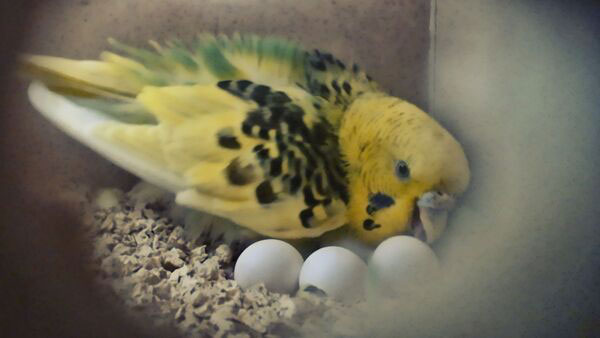
There are a few ways you can bring your budgie out of nesting mode and prevent her from laying more eggs.
- Pin or freeze the laid eggs and put them back in the nest when they come down to room temperature
- Put dummy eggs on her nest.
These measures will make your hen ignore the eggs and lose interest in them. But it’s advised to consult your vet before you opt for any of these options.
FAQs
Let’s get some FAQs answered below.
Some budgies throw eggs out of the nest when they have any doubt about them. They eventually break, and some budgies even eat them.
The budgie lays eggs every other day and won’t start to sit on the eggs until she has laid 2 to 3 eggs. If she has laid all eggs for a clutch and still doesn’t sit on them, she’s probably suffering from some distress or health issues. Wait for a week and if the condition doesn’t improve, talk to your vet.
Related: Why Does My Budgie Stand on One Leg?
Final Words
Since it’s abnormal for a budgie to lay eggs on the bottom of the floor, you should seriously look into the matter. See if everything’s alright about the breeding cage, nest box, room environment, and proper training. Provide them with a healthy diet and carefully handle the eggs using clean gloves if you ever need to. Talk to a bird expert or an avian vet if you notice any health issues behind laying eggs on the cage floor.
However, you can ignore accidents like the egg winding up or falling onto the cage floor from the perch. Make sure they’re into hatching and not suffering from chronic egg-laying syndrome if you’re planning to welcome a new baby bird. Excessive egg laying can cause serious health issues such as egg binding that can hurt their reproductive system and even cost them their life.







